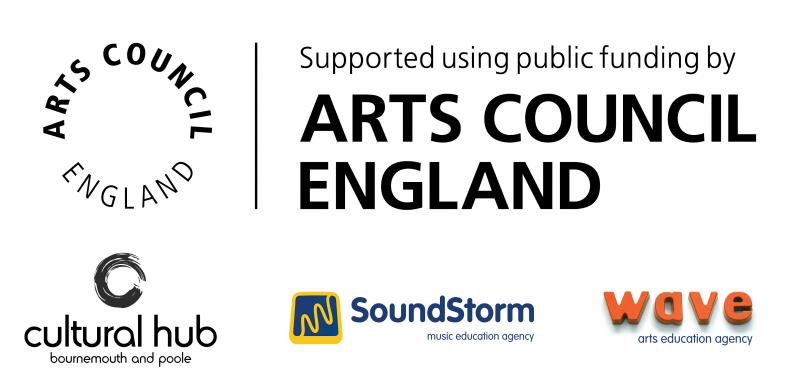Musician in residence
The work
w-RAP is a musical work written and composed by Karen Wimhurst.
In her own words, she set out to explore plastics ‘through a fractured and poetic sung narrative. It’s a story full of heady discoveries by industrial chemists, consumer crazes fuelled by the dawn of advertising, the facilitation of our easy living, a massive aid in the face of poverty and the face of environmental catastrophe… the light and the dark.’
The music is played mainly on instruments made of plastics, involves a turntablist on vinyl, and includes a rap element created from the rhythmic manipulation of plastics wrapping materials.
w-RAP remains work in progress. Currently there are three iterations, which recycle sounds as well as develop themes from one to the other:
- w-RAP one: a parade of sound for a synthetic century, created and performed under Karen Wimhurst’s guidance, by Ferndown Upper School pupils, Arts University Bournemouth, 4 July 2018.
- w-RAP two: a plastics serenade for a synthetic century, written by Karen Wimhurst, directed by Katharine Piercey, performed by soprano Brittany Soriano, trumpeter Elaine Close and vinyl Ole Rudd, with voice-overs by Fraser Wilson, the Sherling Studio, Lighthouse Poole, 26 September, 2018.
- w-RAP three: a poetic mapping of a synthetic century, a collage of sound scapes from w-RAP one and two, with the script, a poem, spoken by the composer, Karen Wimhurst. w-RAP three has also been recorded on vinyl, one pressing of which will be kept in pristine condition at MoDiP in perpetuity.
The artist
Karen Wimhurst is a widely commissioned composer, whose work ranges from chamber works to music theatre and large-scale, collaborative productions in musical genres bridging jazz, folk and contemporary classical ensembles. She is also a clarinetist and educator. The latter came to the fore in w-RAP one, which, under her guidance, was created and performed by students at Ferndown Upper School aged between 12 to 18.
The residency
Karen Wimhurst undertook a residency at MoDiP during the exhibition, Polyphonic: music through plastics. She says: ‘As a kid, I played a plastic clarinet and danced around to vinyl at an early age. MoDiP’s exhibition 'Polyphonic' with its plastic instruments and timeline of records, cassettes, mini discs, ipods was pretty much the story of a large slice of my musical education’ and of the residency: ‘My research period with MoDiP gave me access to all kinds of fascinating materials to help me with the construction of w-RAP in all its forms, including educational materials for the schools. I was given book lists (including magazines from the 1940’s; an original Bakelite promo book from the 1920’s); access to museum’s collection… In addition, the MoDiP team gave me their time and expertise discussing the libretto for w-RAP two fully in first draft, looking through any amendments and generally reflecting on the content of this script. Thus, the residency played a crucial part in the development of w-RAP, its music and libretto.
Wider engagement
One of w-RAP’s aims was to foster interest in the plastics debate by those who might not normally visit the museum. To this end, working both with musical educator, Nick Crump, and w-RAP’s composer, we held workshops at MoDiP for 183 children from five Dorset primary schools under the title ‘Expression through music’. These young people made and played bassoons out of plastic bottles and their music was recycled into the three iterations of w-RAP. The flavour of these workshops is captured in a video by Lizzie Sykes below.
The composer also worked intensively with Ferndown Upper School students. She anticipated that they would be well-informed about plastics pollution but this was not the case. As a result she encouraged small group creative work, which engaged them with the wide-ranging issues concerning initial development of plastics through to the current situation. According to their teacher: ‘The exploration of both the benefits and pitfalls and the reason for its development has had a huge impact. As a result of the project students went to the school council to discuss the school becoming plastic free - the council and senior leaders have agreed that this is something we should strive for. The canteen have stopped using straws, plastic cutlery and the school has reduced the amount of bin bags/liners significantly, with the view of becoming a totally plastic free school.’ This learning experience, including excerpts from Ferndown Upper School’s performance of their version of w-RAP, has been captured in a short video below.
w-RAP two, performed to a mainly adult audience at Poole’s Lighthouse, was preceded by a short talk by Susan Lambert about plastics’ contribution to sustainability and, following the performance, there was lively debate about both plastics and the stand w-RAP takes in respect of this controversial subject. Again we were pleased to have the opportunity to discuss this important subject with people who might not visit the museum. The discussion was also extremely useful in enabling the composer to reflect on what needed better sign posting. That led to the decision to present the w-RAP script in w-RAP three as a spoken poem set against a collage of content from the previous iterations.
The project has since been developed in to Synthetica: A toxic enchantment

